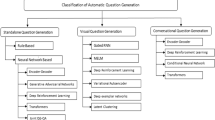Abstract
Automatic question generation can play a vital role in educational applications such as intelligent tutoring systems. Prior work in question generation relies primarily on one view of the sentence provided by a parser of a given type, such as phrase structure trees or predicate argument structure. In contrast, we explore using multiple views from different parsers to create a tree structure which represents items of interest for question generation. This approach resulted in a 17% reduction in the error rate compared with our prior work, which achieved a 44% reduction in the error rate compared to state-of-the-art question generation systems. Additionally, the work presented in this paper generates with greater question variety than our previous work, and creates 21% more semantically-oriented versus factoid questions.
Access this chapter
Tax calculation will be finalised at checkout
Purchases are for personal use only
Preview
Unable to display preview. Download preview PDF.
Similar content being viewed by others
References
Afzal, N., Mitkov, R.: Automatic generation of multiple choice questions using dependency-based semantic relations. Soft Computing 18(7), 1269–1281 (2014). Springer
Agarwal, M., Shah, R., Mannem, P.: Automatic question generation using discourse cues. In: Proceedings of the 6th Workshop on Innovative Use of NLP for Building Educational Applications. Stroudsburg. PA, USA (2011)
Boyer, K., Piwek, P.: QG2010: The third workshop on question generation. In: International Conference on Intelligent Tutoring Systems. Carnegie Mellon University, Pittsburgh, PA (2010)
Cheong, H. and Shu, LH.: Automatic extraction of causally related functions from natural language text for biomimetic design. In: ASME 2012 International Design Engineering Technical Conferences and Computers and Information in Engineering Conference (2012)
Collobert, R., Weston, J., Bottou, L., Karlen, M., Kavukcuoglu, K., Kuksa, P.: Natural language processing (almost) from scratch. The Journal of Machine Learning Research 12 (2011)
Curto, S., Mendex, A., Coheur, L.: Question generation based on lexico-syntactic patterns learned from the web. Dialogue & Discourse 3(2) (2012)
De Marneffe, M., MacCartney, B., Manning, C.: Generating typed dependency parses from phrase structure parses. In: Proceedings of LREC, vol. 6, (2006)
De Marneffe, M., Manning, C.: Stanford typed dependency manual (2008)
Heilman, M., Smith, N.: Good question! statistical ranking for question generation. In: Human Language Technologies: The 2010 Annual Conference of the North American Chapter of the Association for Computational Linguistics (2010)
Heilman, M., Smith, N.: Rating computer-generated questions with mechanical turk. In: Proceedings of the NAACL HLT 2010 Workshop on Creating Speech and Language Data with Amazon’s Mechanical Turk (2010)
Jurafsky, D., Martin, J.: Speech and Language Processing, 2nd edn. Pearson (2009)
Kalady, S., Elikkottil, A., Das, R.: Automatic question generation using discourse cues. In: Proceedings of the 6th Workshop on Innovative Use of NLP for Building Educational Applications. Stroudsburg, PA, USA (2011)
Le, N., Kojiri, T., Pinkwart, N.: Automatic question generation for educational applications-the state of the art. Advanced Computational Methods for Knowledge Engineering 325–338 (2014)
Mannem, P., Prasad, R., Joshi, A.: Question generation from paragraphs at upenn: Qgstec system description. In: Proceedings of QG2010: The Third Workshop on Question Generation (2010)
Mazidi, K., Nielsen, R.D.: Linguistic considerations in automatic question generation. In: Proceedings of ACL, Baltimore, Maryland (2014)
Nivre, J.: Dependency grammar and dependency parsing. MSI report 5133(1959), 1–32 (2005)
Olney, A., Graesser, A.C., Person, Nl: Question generation from concept maps. Dialogue & Discourse 3(2), 75–99 (2012)
Pal, S., Mondal, T., Pakray, P., Das, D., Bandyopadhyay, S.: Qgstec system description-juqgg: A rule based approach. In: Proceedings of QG2010: The Third Workshop on Question Generation (2010)
Rus, Vasile, Cai, Zhiqiang, Graesser, Arthur C.: Experiments on generating questions about facts. In: Gelbukh, Alexander (ed.) CICLing 2007. LNCS, vol. 4394, pp. 444–455. Springer, Heidelberg (2007)
Rus, V., McCarthy, P.M., McNamara, D.S., Graesser, A.C.: A study of textual entailment. International Journal on Artificial Intelligence Tools 17(04) (2008)
Wolfe, J.H.: Automatic question generation from text-an aid to independent study. ACM SIGCUE Outlook 10(SI) (1976)
Wu, F., Weld, D.: Open information extraction using wikipedia. In: Proceedings of the 48th Annual Meeting of the Association for Computational Linguistics, pp. 118–127 (2010)
Yao, X., Zhang, Y.: Question generation with minimal recursion semantics. In: Proceedings of QG2010: The Third Workshop on Question Generation (2010)
Author information
Authors and Affiliations
Corresponding author
Editor information
Editors and Affiliations
Rights and permissions
Copyright information
© 2015 Springer International Publishing Switzerland
About this paper
Cite this paper
Mazidi, K., Nielsen, R.D. (2015). Leveraging Multiple Views of Text for Automatic Question Generation. In: Conati, C., Heffernan, N., Mitrovic, A., Verdejo, M. (eds) Artificial Intelligence in Education. AIED 2015. Lecture Notes in Computer Science(), vol 9112. Springer, Cham. https://doi.org/10.1007/978-3-319-19773-9_26
Download citation
DOI: https://doi.org/10.1007/978-3-319-19773-9_26
Published:
Publisher Name: Springer, Cham
Print ISBN: 978-3-319-19772-2
Online ISBN: 978-3-319-19773-9
eBook Packages: Computer ScienceComputer Science (R0)




